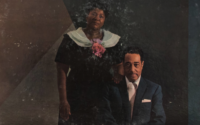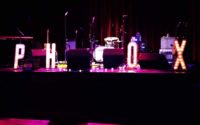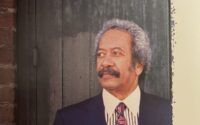Weyes Blood’s “God Turn Me Into a Flower”
The problem of long covid looks different for everyone who ends up with this unfortunate condition, and many experience overlapping diagnoses. For me, it has become both a malfunctioning of my autonomic nervous system and, it seems, an autoimmune disorder. My body does not work very well and often attacks itself, making it difficult to do much of anything with the assurance that it will be ok. Life, in many ways, has retreated. Or rather I have.
Music, interestingly enough, isn’t always the help it should be, despite writing just a few months ago about how lower, rounder notes seemed to soothe my overactive sympathetic nervous system. A physical therapist I saw—the only practitioner I’ve been able to, while navigating the months-long wait times to see other specialists—told me that dysautonomia, at least, overlaps in many ways with concussions. Too many stimuli (think: bright lights and loud sounds) doesn’t feel good and impacts recovery.
It’s true. Driving, with all the attention it requires, has grown more complicated. To a lesser extent, where once I could read with a quiet classical or jazz album playing in the background, I now have to choose. My brain can’t navigate both. And don’t get me started on live music. I went to see NNAMDÏ at the beginning of November—my first show in three months. I wore medical-grade compression tights and alternated between sitting and standing so my blood pressure didn’t drop to the point where I’d faint. I managed to make it through both brief opening acts, but by the time NNAMDÏ hit the stage, I could only last five more songs before I needed to leave. The next morning, I felt like I’d been hit by a truck and it took another full day before my energy evened out.
A loud concert, replete with bright stage lights, is draining in a way it never used to be. I find myself pleading with my body, “Just one more song,” trying to stretch myself to last a little longer in the way I used to push myself during a workout with another heavy rep. The problem is, I can’t push myself anymore. My energy doesn’t rebound the way it does for a healthy person. And if I drain one bucket—say, physical energy—my other two buckets (emotional and mental energy) suffer. I only have so much and I have to be careful about how I spend it.
You might imagine how all of this feels to a music writer. Strip away my ability to immerse myself in music—either at home or in the world—and life starts to look not just bleak but rotten. I miss live music desperately. I miss my life. I miss being able to go through an entire day and not think about my body, about every minuscule sensation and whether it means I’m heading toward collapse. I’ve never been more aware of my body; I’ve never felt more trapped.
Music was once an escape. And, don’t get me wrong, it still can be at times. But it’s different now. Life is so different now. It’s less like living and more like surviving. When you’re lying awake at 3 am because you can’t get your heart rate below 90 bpm, you start to wonder not only how many beats you have left but also if this is the quality of life you’ll be resigned to for those remaining days. During such moments, it’s hard to keep the bitterness at bay, especially when, despite taking every precaution for two years and getting vaccinated and boosted, one stupid evening at an outdoor concert (with my ex of all people) upended everything. Talk about bad decisions; talk about repercussions.
But let’s veer away from the cliff. This fall, I’ve been spending more time in Toronto scoping out neighborhoods. And each time I go, I feel better. I don’t read any wild significance ino that because these disorders can “flare,” so I may just be experiencing a more stable period. (And, really, I don’t let myself think in terms of “better” because in October, after a few good days, I made the mistake of telling a friend that perhaps I’d turned a corner only to crash hard and stay there.) But I’ll take the reprieve. For whatever reason, I’m less symptomatic up here.
On my current trip north, I awoke one morning and pulled back the long expanse of curtains covering the room’s large bay window. As the rising sun shifted the colors of the sky, I watched a neighbor’s chimney add puffs of smoke to the passing clouds. The quiet moment felt ripe for music. I went to get my headphones and chose Weyes Blood’s “God Turn Me Into a Flower,” from her new album And in the Darkness, Hearts Aglow. The six-minute prayer felt like a balm. God, turn me into a flower: A deep purple one. Let me sway in the gentle evening breeze. Let me gaze at the wide expanse of sky and watch the clouds mark time.
The moment felt so tranquil it almost bordered on hope.
The warmest organ opens the song. Natalie Mering’s rapturous voice portrays life as a performer and the loneliness it engenders. In the mirror Mering sings about, the one she faces nightly looking for recognition and meaning, I perceive my new grasp on loneliness, one which stems from being isolated in profound, bewildering ways. It is the loneliness of being unwell and unable to participate. “It always takes me, such a curse to be so hard/ You shatter easily and can’t pick up all those shards/ It’s the curse of losing yourself when the mirror takes you too far,” Mering sings, and I hear myself between the lines.
But this song is less about being mired in and by an experience and more about building toward a release. The result affects me more musically than lyrically. After singing “God, turn me into a flower” for the second time, a hymn-like vocal interplay carves out space, as though a church choir had raised their collective voices to shrive themselves. The acquiescence is palpable and I feel my body soften its grip.
The track transforms into an instrumental with radiant synths from Oneohtrix Point Never (Daniel Loptain) that sound like water sliders making the subtlest impression on the surface before skittering away. Against that scene, Mering vocalizes and hums, breathing upward into the ether. I imagine a majestic natural cathedral—the nave a lush field of wildflowers—and her voice stretching into the far and away. Toward the end, her vocals dissolve into the background, replaced with birdsong and other found sounds. The transition happens slowly but entirely. We are here one moment and gone the next.




